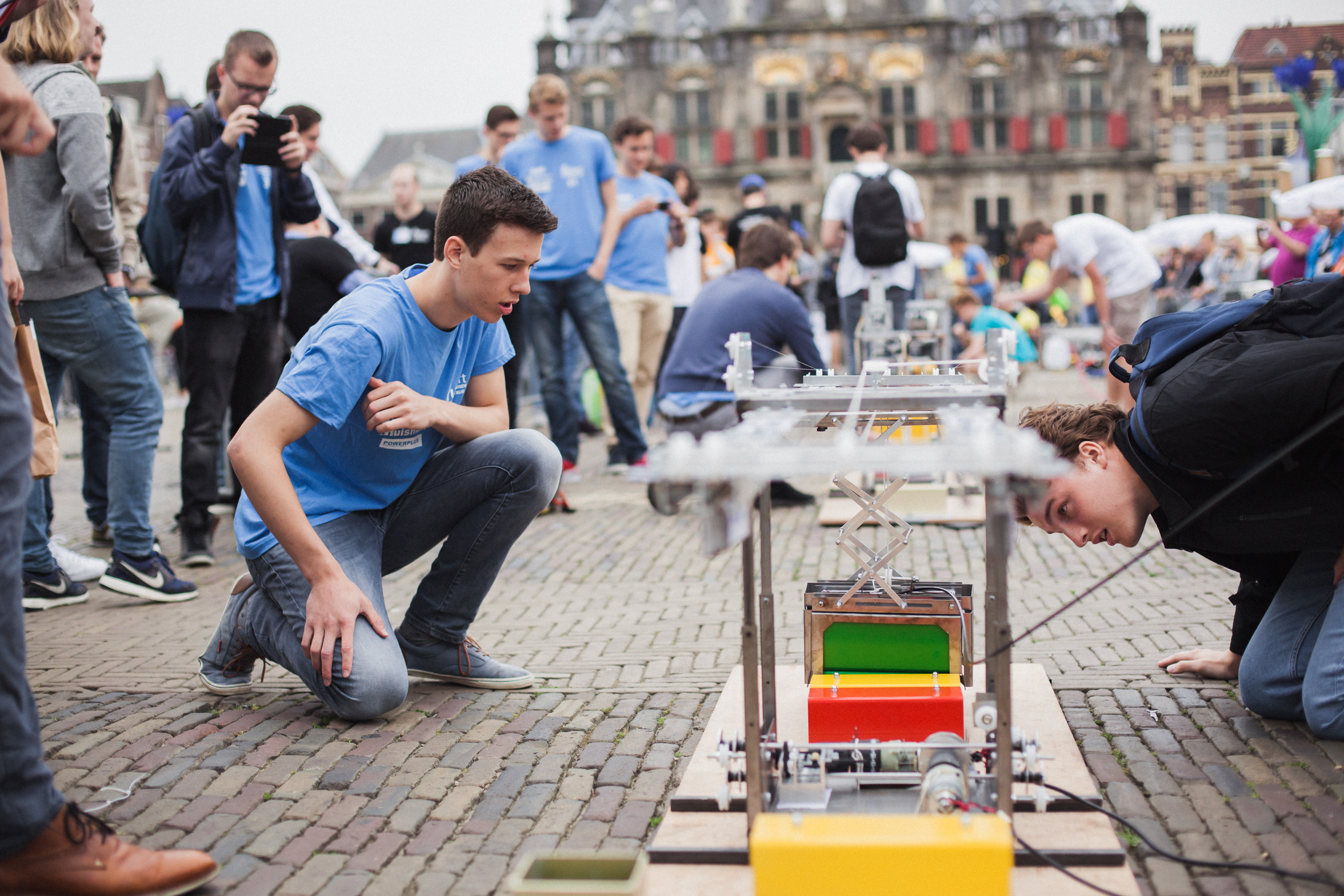What and who is behind the mechanical engineering design competition?
Preparations for the design competition for students in the mechanical engineering bachelor programme’s have been underway for quite some time now. So how do you make sure that everything is well organised and that hundreds of students are fully committed to their freshmen design courses? Regine Vroom, lecturer at the ME faculty’s Department of Precision & Microsystems Engineering, and her compact team (a.o. Jos Knoester en Anton van Beek) arrange everything for teachers and mentors, so they can provide students with the best possible support in their design projects and the design competition.
The design competition for freshmen mechanical engineering students is the conclusion of a major technical freshman design project. Many students are enthusiastic about the design courses. To quote from an evaluation of one of the design courses: ‘It’s a field that enables them to develop their practical skills. It teaches you how to apply theory and solve problems yourself.’
Though the design project teaches students how to apply the theory they’ve learnt, it’s not a practical course, Regine Vroom stresses. Students have to back up their reason for choosing a particular concept with strong arguments. ‘We want them to make several test models and calculate critical components.’ Analysing is an important part of the design process. Students have to indicate how they expect their design to work before they can make it and test it. After testing it, they analyse how the theory has worked out, and why. ‘The analysis beforehand and afterwards accounts for a significant amount of the credits that they’ll receive in their freshman year.’ The emphasis is on insight and understanding and not on learning facts. In the projects, students learn how to apply their knowledge, make technical designs and work together with colleagues.
Regine Vroom has dozens of favourable assessments of the course on her computer. Which doesn’t surprise her. ‘I’m always really impressed when I walk past the design desks and see students working on a whiteboard or building a 3D model and then discussing it with their mentor or project teacher. Especially when their results start to gain traction,’ Vroom says. ‘It works so well because they can immediately see how the theory is put together in practice. For example, they learn everything about applying mechanics, mathematical calculations, modelling, drawing, programming, materials science and all kinds of manufacturing techniques. Not everyone had the chance as a child to take apart a device to see how everything inside it works. Now they can discover during the design courses which materials are rigid, for example, which ones are not, and why.’
Organising the course well requires making the necessary arrangements, as Vroom can confirm. In order to ensure that all teachers, mentors and students know what’s expected of them, she’s arranging everything behind the scenes. From schedules, budgets and ideas to motivate everyone, to the rules for the competition, its location and transporting all the necessary equipment. She does this with unwavering dedication and drive, so the design courses and the design competition are an even greater success every year.
Mentors
The design courses and the design competition have been held for more than 25 years, and several changes have taken place in the meantime, Vroom says. Both in terms of content and organisation. Since 2016, project teachers have been providing freshmen with weekly ‘technical-substantive’ support in their group projects. In addition, student mentors help students with any other kind of challenge they may come across. For example, they support them in cooperating with each other on their projects. Clear agreements are made in advance about what students and supervisors expect from each other, which is highly enlightening.
The fact that mentors were introduced is an excellent improvement, according to Bob van der Windt (a 21-year-old senior student). Last year he supervised a group of students as a mentor. ‘When I was a freshman, there weren’t any project teachers yet, and the mentor system wasn’t this well organised. We did work together in our group, but we didn’t really know what to do yet. So we were all groping in the dark a bit. Now everything is much clearer, so it’s fun for both the students and the mentors.’
Source of information
At the beginning of the year many students asked him for advice on how to best tackle everything. ‘I was basically a source of information for them.’ That changed later. ‘Then I was mainly asked questions related to design, and after that our relationship was on more of an equal footing. It was nice to see the students grow like that. It became more challenging for me as well, because I didn’t always have the answer to their questions, such as exactly how to fold a frame for a coffee mug. So I would figure that out for them, or I would point them in the right direction for answers.’
The mentors, in turn, can approach the teachers of the courses. Every week, the mentors and several teachers and a student advisor would get together during lunch break to talk through minor problems. ‘The constant feedback provides clarity and structure,’ Vroom says, ‘which everyone benefits from.’
The latest techniques
Vroom always enjoys walking past the design desks and watching the students toil away. It’s not so surprising that this pleases her. Following her studies in Industrial Design, she moved into the car industry because she wanted to work with the latest techniques. ‘But there I discovered that you’re actually better off at TU Delft for that. Because here the latest techniques are used everywhere in the design courses.’
As enthusiastic as Vroom is, she also believes there’s room for improvement. ‘With so many students, it’s sometimes difficult to free up enough time for the workshop to learn how to weld or master other techniques. A little more room for manoeuvre would be great. It teaches students, on the other hand, how to be creative with their designs and get to work on the whole process. They’ll come across obstacles and challenges in their work lives as well. In short: they’ll learn from this too.’


